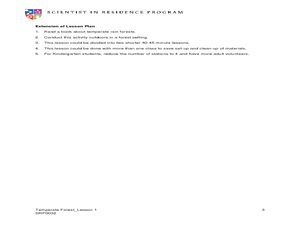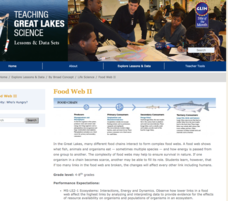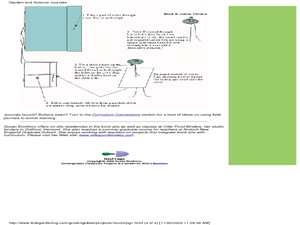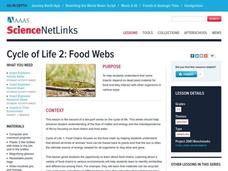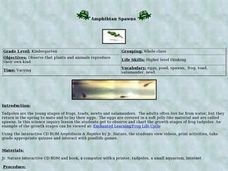Curated OER
Where are Koalas on the Food Chain?
Take a field trip to observe Koalas, absolutely! Budding scientists become familiar with the Koala's position in the food chain. They answer questions based on what they see and draw a food chain explaining the Koalas position. Tip: A...
Curated OER
Can't Wait - Gotta Migrate:The Monarch Butterfly
Students study the migratory behavior of the monarch butterfly and to carefully develop a scientific method for answering one question concerning their behavior. They perform many meaningful tasks which help them explain the Monarch...
BBC
Sound and Hearing
First and second graders recognize that sound is generated in a variety of ways, and that it comes from many different sources. They explore tone and volume, realizing that there are different ways to describe sound. Some musical...
BBC
Light and Shadows
Light is such an amazing thing! Elementary schoolers explore the wonderful world of light and shadow. The lesson is meant to be carried out on a whiteboard. Objects are placed in front of a light source, and learners must predict what...
Curated OER
Exploring Forest Objects
Students explore the forest. In this ecosystems instructional activity, students rotate through sensory activity centers, brainstorm, and read about temperate forests.
Tech Museum of Innovation
Seed Dispersal
Engineering challenges are not just man-made ... nature has its own set of them. A hands-on STEM activity has groups designing a seed dispersal system. Each group can only use one sheet of paper — a tough task!
Curated OER
School Forest
Sixth graders explore the concept of biodiversity. In this biodiversity lesson, 6th graders discover a variety of planets and animals that live in forests, and how a rotting log benefits that environment. Students also locate seven...
WK Kellogg Biological Station
Sounds of Selection
Do you want a creative and fun way to teach about natural selection? Hop to it by turning your middle school princes and princesses into frogs trying to catch as many bugs as possible in a Hungry Hungry Hippos style game. For high...
NOAA
A Laboratory Simulation of Ocean Surface Currents
Stimulate interest in ocean currents with a simulation. The first installment of a five-part middle school series teaches future oceanographers about the forces that interact to cause ocean currents. A simulation shows how wind and the...
Michigan Sea Grant
Food Chains and Webs
Starting with a simple food chain, young scientists interpret the difference and interrelatedness between herbivores, carnivores and producers. They answer questions related to cause and effect of food chain disruptions, including the...
Michigan Sea Grant
Food Web II
A food web consists of complex food chains and the more complex the web, the better likelihood of survival. Learners compare and contrast food webs and food chains and discuss concepts like the predator-prey and consumer-producer...
ARKive
Butterflies and Blooms
The Northwoods of Wisconsin are lovely in the summer,and they are also home to many flower and butterfly species. Investigate the ways in which seasonal flowers and butterflies are interdependent on each other for survival with a fun...
Curated OER
How 'bout them bones!
After a lesson on the human skeleton, hand out a worksheet that requires learners to identify the pelvis, rib cage, skill, spine, and thigh bones. They draw a line from the name of the bone to its location on the skeleton. Tip: Instead...
Curated OER
Wildlife Conservation I
Focusing on the wildlife in their area, learners identify endangered and threatened species and what these animals need to survive. While this activity involves animals in the Long Island area, it could be adapted for use with any area.
Curated OER
Prairie Scales and Prairie Smoothies
Sixth graders explore the animals that live on the prairie and identify differences between amphibians and reptiles and the adaptations each have made to live on the prairie.
BBC
Sorting and Using Materials
First and second graders see that everyday objects are made from a variety of materials. They interact with objects such as keys, plastic spoons, a wooden ruler, a towel, and a plastic bag. A discussion ensues which leads them to...
Curated OER
The Great Kapok Tree by Lynne Cherry
With The Great Kapok Tree, by Lynne Cherry as the hook learners discuss the rainforest, the animals that live there, and conservation efforts. Then, students write a letter to the man in the story asking him not to cut down the Kapok...
Curated OER
Amazon Food Chain
Explore food chains in the Amazon Rainforest using this resource. Learners discuss the predator vs. prey relationships in the food chain. Then, they create a food web to describe this relationship. This is a simple and effective way to...
Curated OER
Making Field Journals
Young scholars follow a bookmaking format to create a book and use it as a garden journal. In this science journal lesson, students follow book making directions to create a garden and science journal.
Curated OER
Where Are the Dinosaurs?
Students examine the concept of extinction by studying dinosaurs. For this living environment lesson, students view dinosaur video clips and define the word "extinction." Students visit the "Zoom Dinosaur" website to investigate various...
Curated OER
Window Gardens
High schoolers use a plastic sandwich bag containing a damp paper towel taped to a window as a model system to observe the germination and early growth of radish seeds. They are challenged to pose a question about seed germination and...
Curated OER
Biology - Virus Modeling
High schoolers research one of the many types of viruses. They create a 3-D model of the virus they researched with graphics software.
Curated OER
Weather, Climate and Atmospheric Process
Students explore Earth science by completing a could identification activity. In this weather lesson, students discuss the different forms of measurement for the weather of Earth. Students discuss global warming and examine a list of...
Curated OER
Amphibian Spawns
Students observe tadpoles as they gradually change into adults. For this amphibian biology lesson, students watch tadpoles in a tank in the classroom, keep a daily record of what they observe, and chart the growth development of the...






